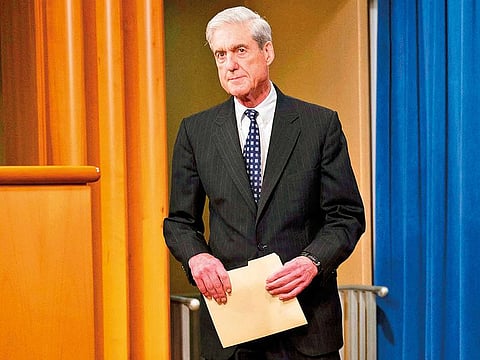Mueller breaks his silence: What happens next?
Will it be enough to upend the debate among House Democrats over impeaching Trump?

Washington: Robert Mueller finally broke his silence.
In his first public comments in the nearly two-year Russia investigation, the special counsel gave some new insight into what he believed were the key parts of his 22-month probe of Russian election interference and US President Donald Trump’s campaign. And he revealed a deep reluctance to say any more before Congress or the public ever again.
Democratic House leaders brushed aside that reluctance and said they would call him anyway, hoping to give the House’s investigation of President Donald Trump a lift even as several senior Democrats joined the rising clamour to begin impeachment proceedings.
If we had had confidence that the president clearly did not commit a crime, we would have said so... We did not, however, make a determination as to whether the president did commit a crime.Robert Mueller
The range of responses underscored the power of Mueller’s first, and so far only, public statement about his two-year investigation and the 448-page report it produced. But with lawmakers scattered around the country for the Memorial Day recess, it remained to be seen whether the impact of his words - that Trump could neither be exonerated of obstruction of justice nor charged under Justice Department policy - would prove forceful enough to upend the debate among House Democrats over impeaching Trump.
“If we had had confidence that the president clearly did not commit a crime, we would have said so,” Mueller said in his nine-minute news conference. “We did not, however, make a determination as to whether the president did commit a crime.”
Here are the key takeaways from Mueller’s public statement:
CHARGING TRUMP ‘NOT AN OPTION’
The report said it in a lawyerly way, but Mueller put a point on it. From the start, he couldn’t bring charges - even in secret - against Trump, or any sitting president. That’s what a Justice Department legal opinion says, and Mueller said he had to adhere to it. “Charging the president with a crime was therefore not an option we could consider,” he said. But don’t mistake that for exoneration, Mueller said. “If we had had confidence that the president clearly did not commit a crime, we would have said so,” Mueller said.
NO NEW INFORMATION TO CONGRESS
To Mueller, his report is his testimony - and he’d like to leave it at that. The special counsel acknowledged that his office has been in discussions with Congress about testifying. But he drew a line, saying he wouldn’t discuss anything outside what was in his report. “I do not believe it is appropriate for me to speak further about the investigation or to comment on the actions of the Justice Department or Congress,” Mueller said.
MOVING THE NEEDLE ON IMPEACHMENT
Mueller’s comments renewed calls for impeachment hearings from Democrats and one House Republican, Justin Amash of Michigan. Mueller’s remarks also nudged two Democratic presidential candidates, Senators Cory Booker of New Jersey and Kirsten Gillibrand of New York, to push for the start of the impeachment process after they declined to do so in the past. As of now, nine of the 23 major candidates seeking the Democratic presidential nomination have called for an impeachment inquiry.
But House Speaker Nancy Pelosi is not among those supporting impeachment. And the House Judiciary Committee chairman, Rep. Jerrold Nadler of New York, stopped short in his remarks after Mueller’s statement, saying only that “it falls to Congress to respond to the crimes, lies and other wrongdoing of President Trump - and we will do so.”
For their part, Republicans seized on Mueller’s comment that he hopes his comments Wednesday will be the “only time” he’ll speak on the matter. The chairman of the Senate Judiciary Committee, Sen. Lindsey Graham of South Carolina, said that Mueller “has decided to move on,” and Congress should, too.
A ‘FAIR’ INVESTIGATION, NOT A ‘WITCH HUNT’
For two years, Mueller has weathered Trump casting his team as “angry Democrats” out to get him at all costs. But Mueller undercut that narrative. In fact, he said his team was “guided by the principles of fairness” to the president. Under Justice Department policy, Trump could be investigated, Mueller said, because “it is important to preserve evidence while memories are fresh and documents are available.” But since he couldn’t be charged, Mueller said his team wouldn’t go further because “it would be unfair to potentially accuse somebody of a crime when there can be no court resolution of an actual charge.”





